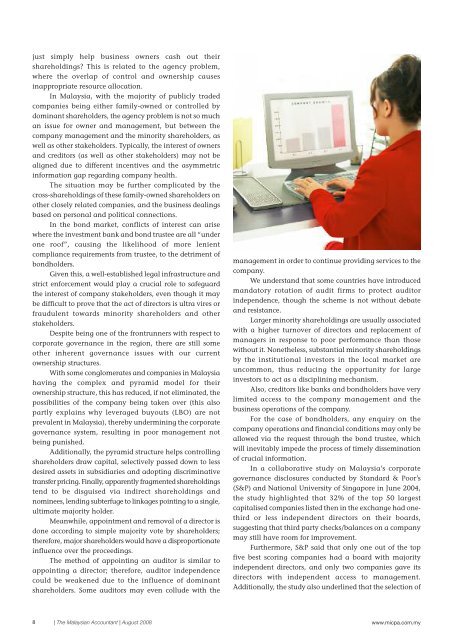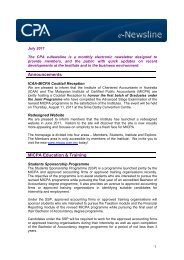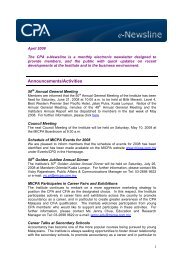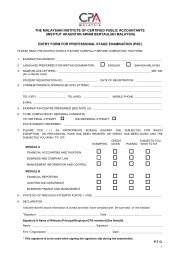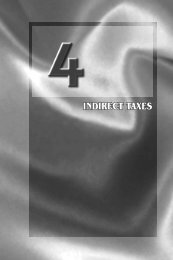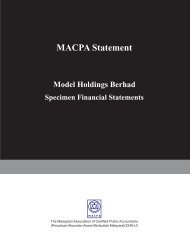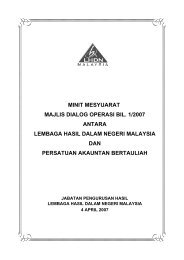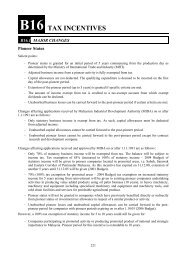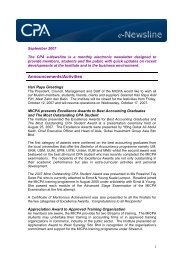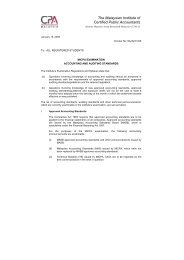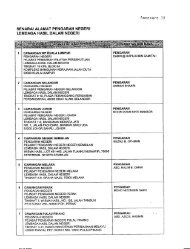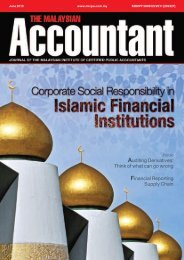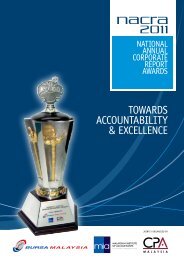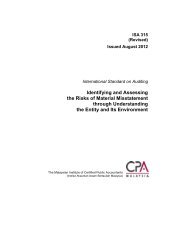just simply help business owners cash out theirshareholdings? This is related to the agency problem,where the overlap of control and ownership causesinappropriate resource allocation.In Malaysia, with the majority of publicly tradedcompanies being either family-owned or controlled bydominant shareholders, the agency problem is not so muchan issue for owner and management, but between thecompany management and the minority shareholders, aswell as other stakeholders. Typically, the interest of ownersand creditors (as well as other stakeholders) may not bealigned due to different incentives and the asymmetricinformation gap regarding company health.<strong>The</strong> situation may be further complicated by thecross-shareholdings of these family-owned shareholders onother closely related companies, and the business dealingsbased on personal and political connections.In the bond market, conflicts of interest can arisewhere the investment bank and bond trustee are all “underone roof”, causing the likelihood of more lenientcompliance requirements from trustee, to the detriment ofbondholders.Given this, a well-established legal infrastructure andstrict enforcement would play a crucial role to safeguardthe interest of company stakeholders, even though it maybe difficult to prove that the act of directors is ultra vires orfraudulent towards minority shareholders and otherstakeholders.Despite being one of the frontrunners with respect tocorporate governance in the region, there are still someother inherent governance issues with our currentownership structures.With some conglomerates and companies in Malaysiahaving the complex and pyramid model for theirownership structure, this has reduced, if not eliminated, thepossibilities of the company being taken over (this alsopartly explains why leveraged buyouts (LBO) are notprevalent in Malaysia), thereby undermining the corporategovernance system, resulting in poor management notbeing punished.Additionally, the pyramid structure helps controllingshareholders draw capital, selectively passed down to lessdesired assets in subsidiaries and adopting discriminativetransfer pricing. Finally, apparently fragmented shareholdingstend to be disguised via indirect shareholdings andnominees, lending subterfuge to linkages pointing to a single,ultimate majority holder.Meanwhile, appointment and removal of a director isdone according to simple majority vote by shareholders;therefore, major shareholders would have a disproportionateinfluence over the proceedings.<strong>The</strong> method of appointing an auditor is similar toappointing a director; therefore, auditor independencecould be weakened due to the influence of dominantshareholders. Some auditors may even collude with themanagement in order to continue providing services to thecompany.We understand that some countries have introducedmandatory rotation of audit firms to protect auditorindependence, though the scheme is not without debateand resistance.Larger minority shareholdings are usually associatedwith a higher turnover of directors and replacement ofmanagers in response to poor performance than thosewithout it. Nonetheless, substantial minority shareholdingsby the institutional investors in the local market areuncommon, thus reducing the opportunity for largeinvestors to act as a disciplining mechanism.Also, creditors like banks and bondholders have verylimited access to the company management and thebusiness operations of the company.For the case of bondholders, any enquiry on thecompany operations and financial conditions may only beallowed via the request through the bond trustee, whichwill inevitably impede the process of timely disseminationof crucial information.In a collaborative study on Malaysia’s corporategovernance disclosures conducted by Standard & Poor’s(S&P) and National University of Singapore in June 2004,the study highlighted that 32% of the top 50 largestcapitalised companies listed then in the exchange had onethirdor less independent directors on their boards,suggesting that third party checks/balances on a companymay still have room for improvement.Furthermore, S&P said that only one out of the topfive best scoring companies had a board with majorityindependent directors, and only two companies gave itsdirectors with independent access to management.Additionally, the study also underlined that the selection of8 | <strong>The</strong> <strong>Malaysian</strong> Accountant | August <strong>2008</strong> www.micpa.com.my
a company’s audit, remuneration and nominationcommittees were not really transparent for most of thecompanies.From recent corporate governance cases, there are afew major trends to take note from local bond issuers:Non-compliance of information covenants: A mostcommon trait that problematic companies tend to have.We notice that most troubled companies were slow toprovide timely information on their financial health priorto heading into trouble; hence, it is a nascent sign to spotailing companies;Related party transactions and improper payments:Business dealings based on non-competitive tenders aredetrimental to company profits, and enrich related parties,such as company directors, senior management and theirfamily members. However, improper payments could beeven harder to substantiate, given that these payments donot require separate disclosure like related partytransactions;Misappropriation of funds: Proceeds of the bondissuance may go to purposes not stipulated in thefinancing documents. Also, general borrowing terms, suchas funding for general working capital requirements, maynot help the surveillance or indicate specificity of proceedsused. Besides, a company may finance certain non-corebusinesses using their projected cash flows, which shouldhave been used to meet their financial obligations andother operational funding requirements; andEarnings manipulation: Commonly known as“creative accounting”, where the managementintentionally attempts to alter financial statements tomislead stakeholders about the company’s underlyingperformance for their private gains. Detecting potentialsigns of earnings manipulation are: the volatility and sizeof earnings relative to cash flows; the correlation betweencash flows and accruals; the extent of discretion inaccounting methodology in areas such as accruals, markto-marketpolicies, and depreciation; and the extent ofloss avoidance and income trend management.Investment implications in corporate governance: Poorcorporate governance implies information asymmetry,which creates risk. In modern investment theory, capitalwill flow to an investment till the marginal rate of returnis on par with the opportunity cost of funding, so thatinvestors would not earn excess returns, under theconditions of an efficient market.However, in reality, investors would have to deal withinformation asymmetry — particularly in privately-heldcompanies, where the coverage of media and analysts aresparse and inadequate. Hence, a higher risk premium andthus lower valuation would usually be accorded byinvestors to little known and poorly “governed” companies.Impact of corporate governance on ratings and PDSyields volatility: Corporate governance issues will inevitablydrive ratings and yields volatility, increasing the returnuncertainties. Poor corporate governance has adverselyaffected the rating prospects of companies. Furthermore,in most circumstances, rating downgrades have beenquick and deep, underscoring the severity of poorcorporate governance to investors. <strong>The</strong> major problems ofpoor governance therefore are its lack of calculable risk, itsuncontrollable nature, and disproportionately largenegative impact to a bond’s credit rating. This is unlike,say, the gradual decline in sales due to a slower businesscycle. As such, we opine it is even more important thatindicators of corporate governance quality be givenweighty consideration.Links between business cycle, “name”, sector preferencesand governance: Investors form their decisions based on thecompany track record and sector preference. It should benoted that issues of corporate governance seldom emergeduring a booming economy, given that companies usuallyenjoy thick profit margins and conducive lendingconditions. Consequently, corporate governance recordsduring the Asian Financial Crisis 1997/98 play a central rolefor the “name” (reputational) preference for a company.However, thriving sectors and heavily regulated industriessuch as banks and insurance companies are usually attachedwith lower risk premiums. It is worth mentioning that themerger & acquisitions and tight central bank supervision inthe banking sector has significantly reduced the link betweencomplex conglomerates and banks as well as ownershipconcentration. Hence, some yield premium imputations ofbetter corporate governance have been accorded to bankbonds. In a nutshell, risk aversion comes hand-in-hand withinvestor preference for well-governed companies.Well-governed companies can enhance returns: Corporategovernance is one of the most crucial qualitative factors ininvestment decisions. Numerous international studies havedemonstrated that investment performance is positivelycorrelated with the quality of corporate governance. In aGlobal Investors Opinion survey done in 2002 by Mckinsey,institutional investors mentioned that they would payadditional 22% premium on average to own well-governedcompanies in Asia and Latin America. In the same vein,good corporate governance does not only reward theinvestors, but also benefits the company itself, given itattracts more investors and lenders, thereby reducingborrowing costs (i.e bond yields).This article appeared in <strong>The</strong> Edge Daily on June 30, <strong>2008</strong>and was extracted from the website at www.theedgedaily.comwww.micpa.com.myAugust <strong>2008</strong> | <strong>The</strong> <strong>Malaysian</strong> Accountant |9


